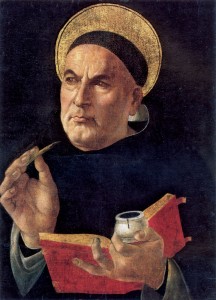 Today is the feast day of Saint Thomas Aquinas (c.1225-1274), one of the greatest philosophers of the Church. He is one of the 35 Doctors of the Church (he is often referred to as the Angelic Doctor), whose writing greatly influenced Western thought and provided us deep and rich analysis of Scripture and application of Catholic Tradition. Strongly influenced by Aristotle, Aquinas performed his work much as a scientist would – citing both sides of an argument and then exploring each to form a conclusion. The continuation of this exercise has formed the philosophical school known as Thomism, which continues to thrive to this day.
Today is the feast day of Saint Thomas Aquinas (c.1225-1274), one of the greatest philosophers of the Church. He is one of the 35 Doctors of the Church (he is often referred to as the Angelic Doctor), whose writing greatly influenced Western thought and provided us deep and rich analysis of Scripture and application of Catholic Tradition. Strongly influenced by Aristotle, Aquinas performed his work much as a scientist would – citing both sides of an argument and then exploring each to form a conclusion. The continuation of this exercise has formed the philosophical school known as Thomism, which continues to thrive to this day.
Why Saint Thomas Aquinas still matters
At Mass today, our priest declared: “Today is the feast day of Saint Thomas Aquinas, the Blessed Angelic Doctor of the Church. He is the source of many headaches for seminarians or laypeople that chose to study his theology.” This is very true, based on the small amount of reading that I have done in Saint Thomas’s “Summa Theologica“. His writing is inherently rational and logical, but it is challenging. He presents very complex theological concepts in very clear terms and explores them so fully that I often find myself pondering a single page or two for a very long time.
This is why I feel that Saint Thomas Aquinas is still important: he presents a framework of exploration and argumentation that can still be used today. It proves that the scientific method can be applied to theological research and discourse. In fact, I once heard a modern Thomist explain that one of the main principles is that any argument can be presented for analysis, so long as both sides are willing to maintain civility during the discussion. I believe this is constructive given the secular focus on scientific research as a tool… the more it appears in theological discussion, the more relevant Aquinas’s work becomes. To me, it appears as a grand example that science and religion need not be enemies, and that religious people can explain their beliefs using rational thought.
My prayer today is that I am granted a small amount of the grace that Saint Thomas Aquinas had, so I might better understand the nature of God and the teachings of the Catholic Church. I think that continuing deeper into Summa Theologica will be one of my Lenten projects this year!
